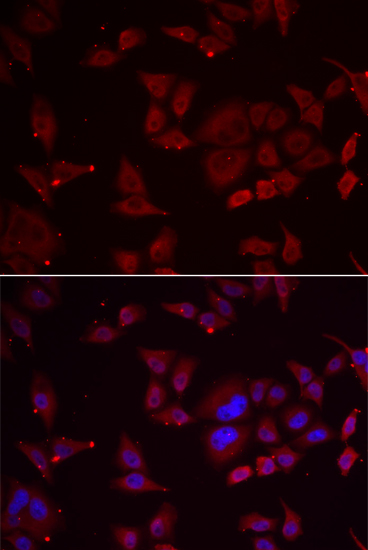| Background: | The protein encoded by this gene belongs to a family of bifunctional proteins that are involved in both the synthesis and degradation of fructose-2, 6-bisphosphate, a regulatory molecule that controls glycolysis in eukaryotes. The encoded protein has a 6-phosphofructo-2-kinase activity that catalyzes the synthesis of fructose-2, 6-bisphosphate (F2, 6BP), and a fructose-2, 6-biphosphatase activity that catalyzes the degradation of F2, 6BP. This protein is required for cell cycle progression and prevention of apoptosis. It functions as a regulator of cyclin-dependent kinase 1, linking glucose metabolism to cell proliferation and survival in tumor cells. Several alternatively spliced transcript variants encoding different isoforms have been found for this gene. |
| UniProt Protein Function: | PFKFB3: Synthesis and degradation of fructose 2,6-bisphosphate. Ubiquitous. 2 isoforms of the human protein are produced by alternative splicing. |
| UniProt Protein Details: | Protein type:Kinase, other; Motility/polarity/chemotaxis; Carbohydrate Metabolism - fructose and mannose; EC 3.1.3.46; Phosphatase (non-protein); EC 2.7.1.105 Chromosomal Location of Human Ortholog: 10p15.1 Cellular Component: cytosol; nucleoplasm Molecular Function:6-phosphofructo-2-kinase activity |
| NCBI Summary: | The protein encoded by this gene belongs to a family of bifunctional proteins that are involved in both the synthesis and degradation of fructose-2,6-bisphosphate, a regulatory molecule that controls glycolysis in eukaryotes. The encoded protein has a 6-phosphofructo-2-kinase activity that catalyzes the synthesis of fructose-2,6-bisphosphate (F2,6BP), and a fructose-2,6-biphosphatase activity that catalyzes the degradation of F2,6BP. This protein is required for cell cycle progression and prevention of apoptosis. It functions as a regulator of cyclin-dependent kinase 1, linking glucose metabolism to cell proliferation and survival in tumor cells. Several alternatively spliced transcript variants encoding different isoforms have been found for this gene. [provided by RefSeq, Apr 2016] |
| UniProt Code: | Q16875 |
| NCBI GenInfo Identifier: | 3023733 |
| NCBI Gene ID: | 5209 |
| NCBI Accession: | Q16875.1 |
| UniProt Secondary Accession: | Q16875,O43622, O75902, Q5VX15, Q5VX18, Q5VX19, B7Z955 |
| UniProt Related Accession: | Q16875 |
| Molecular Weight: | 60,602 Da |
| NCBI Full Name: | 6-phosphofructo-2-kinase/fructose-2,6-bisphosphatase 3 |
| NCBI Synonym Full Names: | 6-phosphofructo-2-kinase/fructose-2,6-biphosphatase 3 |
| NCBI Official Symbol: | PFKFB3 |
| NCBI Official Synonym Symbols: | PFK2; IPFK2; iPFK-2 |
| NCBI Protein Information: | 6-phosphofructo-2-kinase/fructose-2,6-bisphosphatase 3 |
| UniProt Protein Name: | 6-phosphofructo-2-kinase/fructose-2,6-bisphosphatase 3 |
| UniProt Synonym Protein Names: | 6PF-2-K/Fru-2,6-P2ase brain/placenta-type isozyme; Renal carcinoma antigen NY-REN-56; iPFK-2Including the following 2 domains:6-phosphofructo-2-kinase (EC:2.7.1.105)Fructose-2,6-bisphosphatase (EC:3.1.3.46) |
| Protein Family: | 6-phosphofructo-2-kinase/fructose-2,6-bisphosphatase |
| UniProt Gene Name: | PFKFB3 |
| UniProt Entry Name: | F263_HUMAN |







